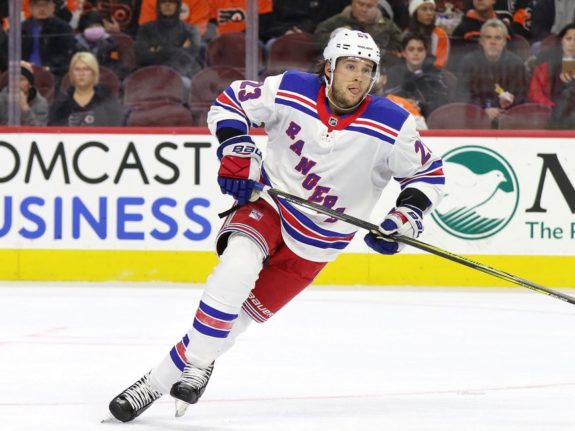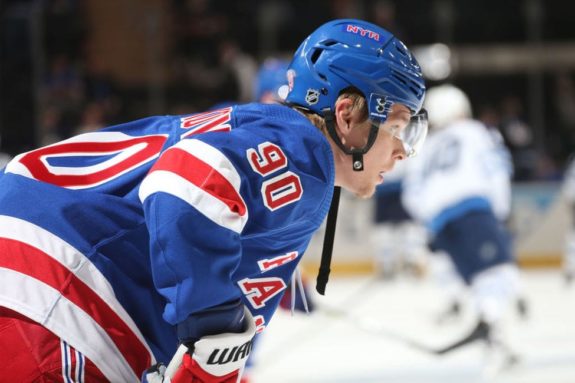Raise your hands if this April feels a bit different than past ones. I’m not talking about the freezing temperatures that have spoiled our springtime fun. No, it’s Stanley Cup playoff time, and the New York Rangers are nowhere to be found in the chase.
It’s the first time in eight seasons that this proud franchise isn’t a part of the mix. The Rangers are in the beginning stages of a rebuild, and changes have been made already, with more to come this summer. The first order of business for general manager Jeff Gorton is hiring a new coach to lead this organization back to prominence.
One of his toughest decisions will be determining the fate of his restricted free agents, especially Ryan Spooner and Vladislav Namestnikov, who don’t have quite the resume with the Rangers as the other candidates. Gorton must decide if one, both or neither have a well-defined role for next season. It wouldn’t surprise anyone if Spooner and Namestnikov were offered short-term deals that bridge the gap until the Rangers’ top prospects are ready to take on full-time roles in the lineup.
Spooner’s Move to the Wing Keys Turnaround
In the Rick Nash trade with the Boston Bruins, the Rangers acquired Spooner as a reclamation project, with the hope that he could become a solid contributor that moves the rebuild in the right direction. Spooner was a second-round draft pick by the Bruins in the 2010 NHL Entry Draft, and he has developed into a smart playmaker rather than a prolific goal scorer. His time in Boston came to an end because his skill set at the center position didn’t fit with the Bruins’ more physical style of play around the net.

The Rangers moved Spooner to the wing position, and immediately, he became an active participant in the offensive zone. Spooner found his game by scoring four goals and 16 points in 20 games with the Blueshirts, which nearly matched his production (nine goals and 25 points) in limited ice time with the Bruins. The open ice has allowed him to move the puck with a little bit more freedom as his natural passing instincts gained more scoring chances for his linemates near the crease. Any organization would love to have Spooner’s versatility on the roster because he can step in and play center on short notice without disrupting the lineup’s level of play.
Namestnikov is Rangers Biggest Enigma
Namestnikov was acquired from the Tampa Bay Lightning in the Ryan McDonagh and J.T. Miller trade moments before the deadline expired. The hope was for him to become another viable scoring option in a revamped lineup. Prior to arriving in New York, Namestnikov was having a breakout campaign (20 goals and 44 points) in Tampa, but he struggled badly to find his comfort zone with the Rangers. Namestnikov’s offensive game was non-existent with only two goals and four points in 19 games, but his play did improve when he was placed on a line with Pavel Buchnevich and Jimmy Vesey. Patience might be running thin for him to find his game, now is the time for Namestnikov to produce or he runs the risk of being replaced in the lineup.

The Rangers hope Namestnikov can regain some of his scoring touch because his versatility to play all threee forward positions brings them roster flexibility for next season. This could become a necessary caveat if the Rangers move ahead with their plan to work top prospects, Filip Chytil and Lias Andersson, into the lineup. A hardworking two-way player like Namestnikov could ease the pressure off the youngsters to produce immediately.
The Rangers’ Options in the Offseason
Ranger fans have to be excited with what lies ahead for the future. You don’t have to be able to read a crystal ball to see this rebuild will be short and sweet as the Rangers are expected to be active in the trade and free-agent market this summer. But, before chasing their desired targets, Gorton and his staff will have to evaluate each restricted free agent and their value to improving the roster for next season.
The odds are low that Spooner and Namestnikov will receive long-term commitments from the Rangers, but accepting a bridge gap (between $2.8-4.75 million range) deal makes sense for both sides. Each can become solid contributors from a third or fourth-line position while helping with the mentorship of Chytil and Andersson, who are the future of this Original Six franchise. Ideally, the production needs to be in the 50-60 point range next season, which could garner them a big-money contract on the open market prior to the 2019-20 campaign.
If the contract negotiations become too expensive, then Gorton must choose between Spooner and Namestnikov and deal the other prior to the draft for more assets. It wouldn’t come as a surprise if either of their names are a part of a trade package that acquires a top-four defenseman.
Both Spooner and Namestnikov have adapted and survived the pressures of playing in New York, but that alone isn’t enough to remain on the Rangers’ roster moving forward.